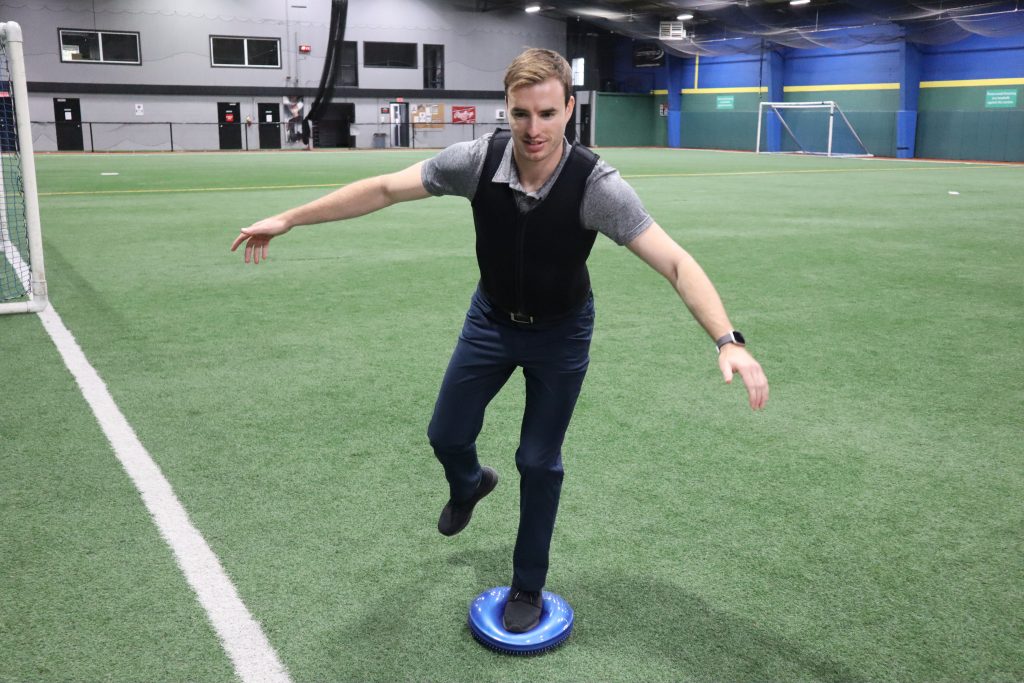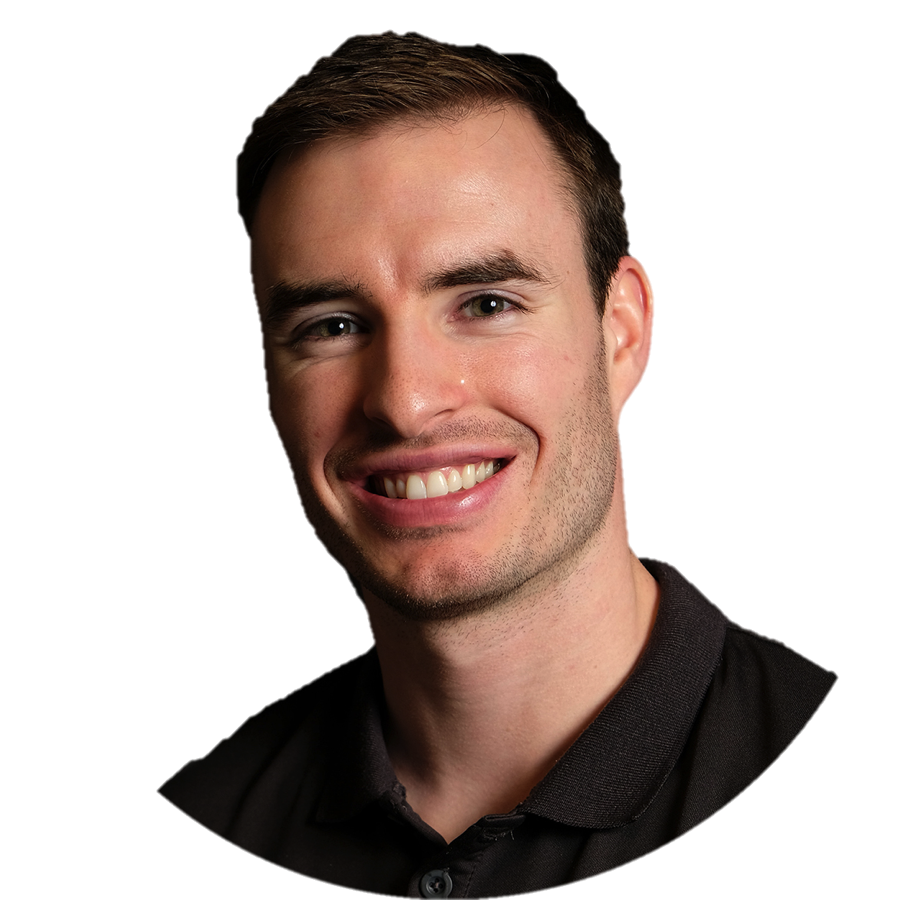5 Must-Know things about Concussions
If you already have a concussion, think you may have a concussion, or just want to understand more about concussions, then this was written for you!

By Dr. Joseph Greenwood, DC
Pro Function Sports Injury Clinic - Sports & Concussion Chiropractor
Here's the thing...
Anytime someone brings up the topic of concussion, they talk about getting hit in the head. Sound familiar? That’s ok: it should. Getting hit directly in the head can be a sure-fire way to get a concussion. But what most people don’t know is that a concussion can also happen even if you don’t hit your head. In fact, your head doesn’t even need to be touched!
Shocker, right?
Well, it’s true. A concussion can happen when your body gets hit, pushed, or jolted with enough force that causes your neck to whiplash back and forth. This quick motion causes the muscles in your neck to stretch, passes the force from your body up to your head, and causes your brain to move and shift inside your skull.
The result: a concussion.
So yes, while the most likely way to get a concussion is through a straight forward hit to your head, it’s important to understand that a sudden force to your chest, shoulder, or back could also be the cause of a concussion.
So, what EXACTLY is a concussion, anyway?
Concussion is a medical term almost everyone has heard at some time or another. Chances are that you, or someone you know, has had at least one. But, and let’s been honest here, has anyone ever explained what exactly a concussion is without using fancy science or confusing medical words? No? Don’t feel bad, it happens – so maybe this will help:
- A concussion is an energy problem.
- After a concussion, your brain uses a ton of its own energy to heal itself. At the same time, because of the injury to the brain (the concussion), your brain is less effective at creating fresh energy to recharge itself.
- This leads to your brain being in a state of low energy, which leads to all of the symptoms people get when they have a concussion (tired, dizzy, weak, low concentration, feeling sick, etc., etc.)
To break this down further, we are going to use the example of an overused cell phone with a faulty charging port.
If you take out your phone and open every app, increase the brightness of the screen, and turn on the flashlight, the phone will need to use more power to do all these things and it’s going to burn through its battery power pretty quickly. This is similar to how the brain needs more energy to heal itself right after a concussion.
If that same phone has a charging port that is finicky, it will not charge properly or, at least, it can’t charge quickly. This is similar to how the brain is injured with a concussion, causing its ability to connect to power to be, well, finicky.
The result is a cell phone that has a lower than normal battery level and, just like the phone, your brain will also have a lower than normal power level, making it difficult to heal and operate normally at the same time.
Sucks, right?
Here is the good news: this “power problem” will not last forever!
When people are in this ‘low-power mode’, they don’t have the energy that’s needed for focusing, concentrating, and remembering. Our body responds with wanting more sleep, rest, and time off work and school.
Trying to continue to do everything or make everyone happy can really run down your battery. Don’t be afraid to take a step back and adjust your schedule to make the first few days and weeks easier on yourself.
**(And bonus, this is the perfect time to have your partner or kids lend a hand with all of those weekly household chores!!)
Interested in more tips like this? Just give our office a call and we can send you a free concussion management E-Book that provides even more techniques so you can learn what to do at home to better recharge your battery and avoid burnout.
“So yes, while the most likely way to get a concussion is through a straightforward hit to your head, it’s important to understand that a sudden force to your chest, shoulder, or back could also be the cause of a concussion.“
Looking to know more? I'll be happy to answer any questions.
Times they are a-changin’
Like most things in the world, our understanding of concussions is always growing. Fifteen years ago, we used to think a concussion was your brain being battered and bruised after bouncing off the walls of your skull… Seriously, that’s how we understood it back then.
Nowadays, advanced research tells us that it’s not so much a bruising of the outside of your brain, but a stretching of the nerves within your brain. This stretching event doesn’t cause any permanent damage; however, it does take time and a lot of energy to heal.
Again, going back years ago, we believed that a person could heal from a concussion in just a few hours or days. Some believed that once your ears stopped ringing and you stopped ‘seeing stars’, your concussion was “recovered” and you were good to go.
Now we know better and understand that this is not the case. Research indicates that 80% of concussions take between 3-4 weeks to fully recover.
Would you like to know what other myths still exist about concussion? (Spoiler alert, there are a lot of myths about concussion – learn more in our next blog.)
Have you ever been told to rest in a dark room until your symptoms go away? Have you been told to stop exercising completely? Have you ever been told your symptoms are probably permanent?
These suggestions are outdated and should no longer be recommended as part of a recovery program. The truth is that there are many things that you can do to help manage your concussion. Rehab, exercise, sleep, diet, and co-management with other health care professionals are the pillars of recovering from a concussion. Interested in learning more? Stay tuned for a future blog diving deeper into this topic.
Pro Function uses the Complete Concussion Management tool as part of its advance treatment therapy.

If you have a concussion, it's time to take action!
These are the top 5 best pieces of advice I want everyone to know about concussions.
1. Be assessed by a health care practitioner trained in concussion management.
You’re going to have questions. This is normal and we expect this. Find someone you trust that has experience in managing the day-to-day changes associated with concussion.
2. Follow the three R’s: RECOGNIZE, REST, and REHAB.
The first step is recognizing that you only have one brain and that you need to take care of it. Take some rest and allow your energy levels to build back up. However, be aware that resting too long can have a negative effect. Starting the right rehab program early on can help you get back to feeling like yourself faster and with more ease.
3. Returning to work, school, and sport all have step-by-step protocols.
Each one of these activities has a specific 5-step protocol to follow to help optimize your safe return.
4. Recovery takes time. Don’t push yourself back too soon.
Having a plan and knowing how to pace yourself can help you get back to feeling like yourself sooner. People who force themselves back too quickly often feel more symptoms for longer periods of time. Be smart. Do it right!
5. Prepare for symptom aggravation or recurrence.
Setbacks occur. If they do, it’s not the end of the world. How you handle setbacks is what’s important. A general rule of thumb is to take some rest, usually 24 hours, and then follow the plan that you and your therapist designed together to get back on track. Remember, recovering from a concussion takes weeks, not days.
In Summary - Here's the Take Away:
Concussions happen. It’s unfortunate when they do, but the fact is they happen with or without a straight forward hit-to-the-head. But that doesn’t mean you can’t help yourself and improve how you are feeling. Far too often people with concussion do nothing, and doing nothing leads to nothing – there’s no way to sugarcoat it.
If you suspect a concussion, you should take action to manage it. Remember, you have so many tools at your disposal:
- Speak to your family doctor or a concussion focused health care provider such as a chiropractor or physiotherapist.
- Follow the 3 R’s – Recognize, Rest, Rehab
- Build a plan around your symptoms to keep yourself active and build a strategy for returning to work / play
- And know that you’re not alone!
If you are having a hard time trying to navigate your way back to full health, don’t have a family doctor, or just have more questions about concussion, we’re here to help you!
Thanks,
– Dr. J. Greenwood, DC
Dr. Joseph Greenwood
Sports and Concussion Chiropractor Pro Function - London Ontario
Dr. Greenwood, and the entire Pro Function Health Care Team, believe that the best health care experience isn’t only about the result, but also about how the patient feels while they work their way to recovery. He takes the time to listen to his patient’s story, understand their unique situation (life, injury, needs and goals), and answer the questions patients needs to begin recovering.
- Modern Rehabilitation Chiropractor
- Concussion Focused Management
- Headache, Dizziness & Balance Rehabilitation
- Sports Chiropractic Care
- Strength & Conditioning Certification
- Works with Athletes & non-athletes of all ages
We’ve got lots more for you!
Follow us on your favorite channel.
Have a topic you’d like us to dive into?
Looking for more details on something you see here? Send us a message or email us at info@profunction.ca.
We’re looking forward to hearing from you!



